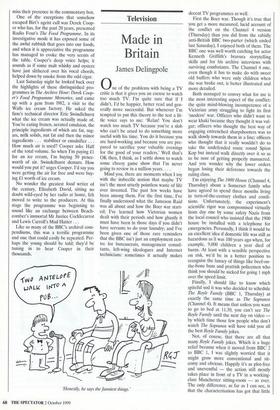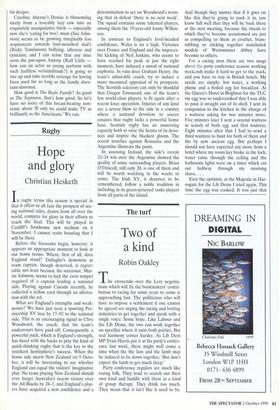Television
Made in Britain
James Delingpole
ne of the problems with being a TV critic is that it gives you an excuse to watch too much TV. I'm quite sure that if I didn't, I'd be happier, better read and gen- erally more successful. But whenever I'm tempted to put this theory to the test a lit- tle voice says to me: `Relax! You don't watch too much IN because you're a slob who can't be arsed to do something more useful with his time. You do it because you are hard-working and because you are pre- pared to sacrifice your valuable evenings for the good of your readers.' Well that's OK then, I think, as I settle down to watch some cheesy game show that I'm never going to review in a million years. .
Mind you, there are moments when I toy with the• imbecilic notion that maybe TV isn't the most utterly pointless waste of life ever invented. The past few weeks have been among them. For the first time, I've finally understood what the Jameson Raid was all about and how the Boer war start- ed; I've learned how Victorian women dealt with their periods and how ghastly it must have been in those days if you didn't have servants to do your laundry; and I've been given one of those rare reminders that the BBC isn't just an employment cen- tre for bureaucrats, management consul- tants, left-wing ideologues and Internet technicians: sometimes it actually makes 'Honestly, he says the funniest things.' decent TV programmes as well.
First the Boer war. Though it's true that you get a more measured, lucid account of the conflict on the Channel 4 version (Thursday) than you did from the rabidly anti-British BBC two-parter (which ended last Saturday), I enjoyed both of them. The BBC one was well worth catching for actor Kenneth Griffith's bravura storytelling skills and for his archive interviews with surviving combatants. The Channel 4 one, even though it has to make do with sweet old buffers who were only children when the war broke out, is better illustrated and more detailed.
Both managed to convey what for me is the most interesting aspect of the conflict: the quite mind-blowing incompetence of a Victorian army struggling to fight its first 'modern' war. Officers who didn't want to wear khaki because they thought it was vul- gar; officers who thought the best way of engaging entrenched sharpshooters was to walk slowly towards them in a line; officers who thought that it really wouldn't do to take the undefended route round Spion Kop but instead walk directly over it so as to be sure of getting properly massacred. And you wonder why the lower orders began losing their deference towards the ruling class.
I'm enjoying The 1900 House (Channel 4, Thursday) about a Somerset family who have agreed to spend three months living in turn-of-the-century clothes and condi- tions. Unfortunately, the experiment's scientific rigor was compromised virtually from day one by some safety Nazis from the local council who insisted that the 1900 house be installed with a telephone for emergencies. Personally, I think it would be an excellent idea if domestic life was still as hazardous as it was 100 years ago when, for example, 9,000 children a year died of burns. At least with a sensible perspective on risk, we'd be in a better position to recognise the lunacy of things like beef-on- the-bone bans and prattish policemen who think you should be nicked for going 1 mph over the speed limit.
Finally, I should like to know which spiteful sod it was who decided to schedule The Royle Family (BBC 1, Thursday) at exactly the same time as The Sopranos (Channel 4). It means that unless you want to go to bed at 11.30, you can't see The Royle Family until the next day on video — by which time those few people who don't watch The Sopranos will have told you all the best Royle Family jokes.
Not, of course, that there are all that many Royle Family jokes. Which is a huge relief because when it moved from BBC 2 to BBC 1, I was slightly worried that it might grow more conventional and sit- corny and obvious. Happily it's as plot-free and uneventful — the action still mostly takes place in front of a TV in a working- class Manchester sitting-room — as ever. The only difference, as far as I can see, is that the characterisation has got that little
bit deeper.
Caroline Aherne's Denise is blossoming nicely from a loveably lazy cow into an exquisitely manipulative bitch — especially now she's 'eating for two'; mum (Sue John- ston) seems to be growing marginally less acquiescent towards foul-mouthed dad's (Ricky Tomlinson) bullying, idleness and cynicism; and I can sense that any time soon the put-upon Antony (Ralf Little — how can an actor so young perform with such faultless verisimilitude?) is going to rise up and take terrible revenge for having been used for so long as the family slave- cum-doormat.
How good is The Royle Family? As good as The Sopranos, that's how good. So let's have no more of this breast-beating non- sense about 'If only we could make TV as brilliantly as the Americans.' We can.











































































 Previous page
Previous page